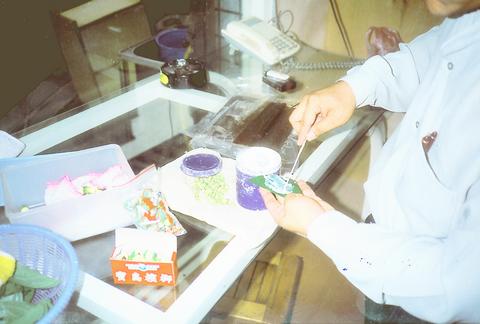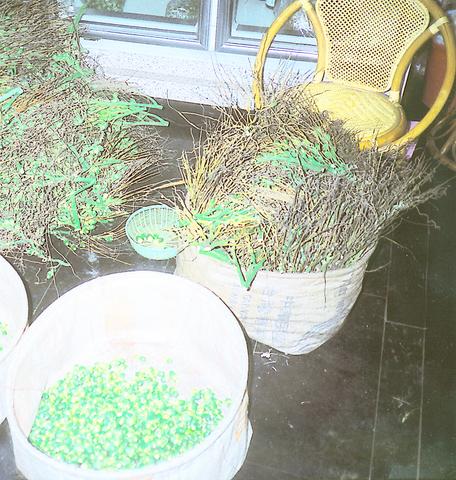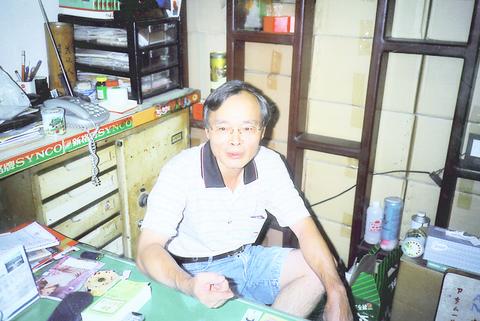Taoyuan County betel-nut stand owners and whole- salers said that they will support the county's "three nos" policy on betel nut beauties but are worried that their business will go from bad to worse.
The Taoyuan County Government has officially informed local betel nut owners and wholesalers in the region that beginning Tuesday, "female betel nut salespersons shall not be scantily clad by exposing their breasts, bellies and buttocks while working."

PHOTO: JIMMY CHUANG, TAIPEI TIMES
That notice didn't seem to concur with a statement on the policy by Taoyuan County Commissioner Chu Li-luan (

PHOTO: JIMMY CHUANG, TAIPEI TIMES
But Taoyuan County's News Department Director Sung Tsu-chiang (
"Yes, these are rules, but at the same time we have to be flexible on this. There's no way a police officer is going to write a ticket if a `betel-nut beauty' is only showing off her stomach. That's not going to happen. But if she's flaunting her private parts, she's going to be in trouble," Sung said, adding that doing so is a clear offense against morals which is clearly regulated in the Criminal Code (

PHOTO: JIMMY CHUANG, TAIPEI TIMES
"We just simply hope that these ladies will not expose themselves in public. That's all," he said.
The birth of 'beauties'
Asked when "betel nut beauties" began to show up at Taiwan's betel-nut stands, Taoyuan County Betel Nut Association Secretary-General Peng Tien-le (
"Probably back in 1998, I think," Peng said. "In the beginning, we just noticed that more and more betel-nut stand owners were hiring young women to sell betel nuts. Gradually these women realized they would get more business whenever they wore fewer clothes, so more and more scantily-clad `betel-nut beauties' began showing up on the streets."
Peng said there aren't only Taiwanese `betel-nut beauties,' but beauties from China as well.
"That is because their husbands are the owners [of the stands]," Peng said. "Otherwise, by law, these Chinese girls wouldn't be allowed to work in Taiwan if they didn't have Taiwanese identification cards."
Peng said that most of the stands who employ the most scantily-clad women are not members of the association.
"We don't have any authority over them so we wouldn't be able to do anything if they asked their employees to wear fewer clothes," he said. "That's why most betel-nut stand owners supported the new policy because we don't like the fact that the public has misunderstood us as being engaged in the sex business because of these scantily-clad women," he said.
Nantou, Chiayi, Pingtung, Hual-ien and Taitung are the major regions where farmers grow betel nut palms. According to Peng, the peak season begins in September and ends in February, when customers can purchase betel nuts at the lowest price. He said prices begin to rise in March and generally peak in June.
Approximately two million people nationwide chew the stimulant, which comes in two varieties, the white-lime or the red-lime betel nut.
Peng said that white-lime betel nuts have become increasingly popular due to flavors and health concerns.
"We call them white lime or red lime because of the color of the lime we use to flavor the betel nuts," Peng said. "Betel nuts are acidic. The lime is alkaline. That's why we use lime as flavors to betel nuts. Compared with white lime, red lime has more flavor than pure lime itself so the color is darker."
To make red-lime betel nuts, betel-nut makers have to cut the betel nut in half, put the red lime in the middle and sandwich the nut with "laohua" (荖花), a kind of nut that is often paired with betel nut. As for white-lime betel nuts, the maker spread white lime on "laoyeh" (荖葉), an edible leaf and then wrap the leaf around the betel nut.
"Make no mistake. `Laoyeh' is not the leaf of `laohua,'" Peng said. "They just sound close but they're not actually related," Peng said. "But both are used to intensify the flavor and taste of the betel nuts."
"When you cut the betel nut in half, the color of the betel nut will darken when it comes into contact with air, just like what will happen to an apple. As a result, many betel-nut makers will bleach the betel nut with chemicals so they look better," Peng said. "But those chemicals are bad for your health. White-lime betel nuts don't have to be bleached because you don't need to cut them in half when you're preparing them for sale."
Does no flesh mean no cash?
Local betel nut stand owners and wholesalers said that the new policy will definitely affect what they said is an already beleaguered industry.
"I think it [the betel-nut business] will definitely go from bad to worse in the beginning," Peng said.
But he said the impact could be temporary if the government strictly carries out the policy, because no one will be able to dress scantily, meaning the playing field will end up leveling out.
"If that happens, quality service and quality betel nuts will become the focus for attracting customers. That's actually the real spirit of this business," Peng said.
"I was told at a meeting with government officials that other counties will follow the same rules if the policy ends up being a success in Taoyuan County. If that's the case, I think it'll be a good chance for us to clear our names and tell the public that the betel-nut business is not a part of the sex industry."
Shi Tsai-yuan (史財源), chairman of the Nantou County Betel Nut Packing Association who is also a betel-nut farmer, expressed similar hopes.
He said that a betel nut stand's average daily income was about NT$15,000 before the economic slowdown, but that the figure is at about NT$4,000 a day now.
"I believe quality conquers all," Shi said. "Beauty is only skin deep. But if your betel nuts taste good, you'll keep your customers."

Palauan President Surangel Whipps Jr arrived in Taiwan last night to kick off his first visit to the country since beginning his second term earlier this year. After arriving at Taoyuan International Airport at around 6:30 pm, Whipps and his delegation were welcomed by Minister of Foreign Affairs Lin Chia-lung (林佳龍). Speaking to gathered media, the Palauan leader said he was excited and honored to be back in Taiwan on his first state visit to Taiwan since he was sworn in this January. Among those traveling with Whipps is Minister of State Gustav N. Aitaro, Public Infrastructure

President William Lai (賴清德) yesterday thanked Palau for its continued support of Taiwan's international participation, as Taipei was once again excluded from the World Health Assembly (WHA) currently taking place in Switzerland. "Palau has never stopped voicing support for Taiwan" in the UN General Assembly, the WHO and other UN-affiliated agencies, Lai said during a bilateral meeting with visiting Palau President Surangel Whipps Jr. "We have been profoundly touched by these endorsements," Lai said, praising the Pacific island nation's firm support as "courageous." Lai's remarks came as Taiwan was excluded for the ninth consecutive year from the WHA, which is being held in

RESOLUTIONS DEBATE: Taiwan’s allies said that UN and WHA resolutions cited by China and other nations ‘do not determine Taiwan’s participation in WHO activities’ A proposal to invite Taiwan to this year’s World Health Assembly (WHA) was rejected on Monday, resulting in Taipei’s absence from the annual meeting for a ninth consecutive year, although partners spoke up for Taiwan’s participation at the first day of the meeting. The first agenda item after the opening was a “two-on-two debate” on a proposal to invite Taiwan to participate at the WHA as an observer. Similar to previous years, two countries made statements in favor of the proposal, while two others expressed their opposition. Philippine Secretary of Health Teodoro Herbosa, president of the 78th WHA, accepted the WHA General Committee’s

At least three people died and more than a dozen were injured yesterday afternoon when a vehicle struck a group of pedestrians in New Taipei City’s Sansia District (三峽). The incident happened at about 4pm when a car rammed into pedestrians at an intersection near Bei Da Elementary School. Witnesses said the sedan, being driven at a high speed, ran a red light, knocking scooters out of the way and hitting students crossing the road before careening into a median near the intersection of Guocheng and Guoguang streets. The incident resulted in three deaths and 13 injuries, including the driver, a 78-year-old man